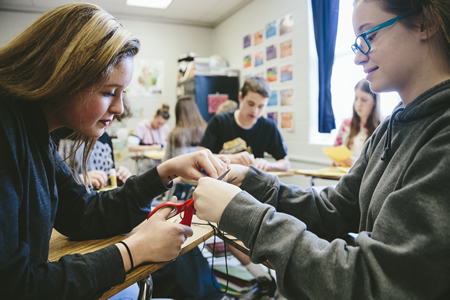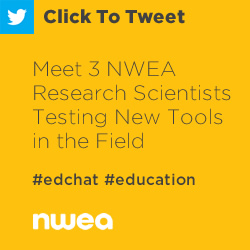 In our first installment of a Partners in Innovation blog, I provided an overview of our program along with a few snippets of the research we having going on in classrooms across the country. But who exactly is doing the research, and what are they passionate about? This post introduces you to our team of researchers who go out in the schools to observe, talk with students and teachers, and solicit valuable feedback about instruction and assessment.
In our first installment of a Partners in Innovation blog, I provided an overview of our program along with a few snippets of the research we having going on in classrooms across the country. But who exactly is doing the research, and what are they passionate about? This post introduces you to our team of researchers who go out in the schools to observe, talk with students and teachers, and solicit valuable feedback about instruction and assessment.
Meet the researchers!
Deb Adkins’ primary focus is on innovation in educational assessment, diagnostic measurement, field research, and efficacy studies. She is particularly interested in the challenges of assessing early learners (pre-K through 2nd grade) and providing information or guidelines for differentiated instruction and assessment. Her most recent classroom research involved developing an app for pre-K and kindergarten students to assess kindergarten and kindergarten readiness skills by getting their feedback on the game-like assessment. She is in the process of completing her PhD in Educational Methodology, Policy, and Leadership—with a focus on methodology—at the University of Oregon.
Meg Guerreiro came to NWEA® with years of classroom instruction experience—first as an elementary and special education teacher and later as an administrator. Much of Meg’s experience was in urban settings. After relocating to Portland from the Philadelphia area, she earned a PhD in Educational Leadership with a focus on Qualitative Methodology. She is ecstatic to have the opportunity to bridge her prior experience (classroom teaching, educational technology, and research) to work on improving and expanding assessment approaches in her current role. In her free time, she enjoys exploring the Pacific Northwest with her family, rock climbing, and landscape photography. She is also adjunct in the Graduate School of Education at Portland State University.
Chase Nordengren studies how teachers and administrators use data to improve outcomes for all students. He currently works on research related to our social-emotional learning assessment. He also works with the professional learning team on how partners use and understand reports. Both projects bring him deep into the practical realities of classroom practice, where he is fortunate to learn directly from teachers and administrators on a regular basis. His past research has addressed, among other topics, the social networks of teacher leaders, principal preparation, and mixed methods validation procedures. He received his PhD in Leadership, Policy, and Organizations in K–12 Systems at the University of Washington. He lives in Portland with his wife and cat. In his leisure time, he can be found working on perfect 100s in all the levels on Super Mario II: Yoshi’s Island.
Here’s what our researchers had to say about the Partners in Innovation program.
What happens in our Partners in Innovation lab schools?
Meg Guerreiro: “At our Partners in Innovation schools, we bridge research with practice. For example, we’ll develop a prototype or an idea (new reporting process, new technology try-out within assessment, new item types). We then work with schools to review that prototype or concept. This can take the form of a 1:1 interview with teachers or students, student try-out, parent conversation, focus group with students, etc. Through this work, we gain the perspective of students, teachers, and parents, which allows us to make improvements to our ideas and helps direct future development work to better meet the needs of educators.”
 What difference can it make to NWEA partners?
What difference can it make to NWEA partners?
Deb Adkins: “Conducting research within the Partners in Innovation program allows NWEA to test assumptions within the environment in which assessments and tools will be implemented. The advantage of this type of prototype development is that students, teachers, and administrators provide feedback from their perspective as to what is engaging (or not), what works for their classroom, and how the tool fits within their school or district environment. We use feedback and empirical data to enhance existing products and inform new products. If we are to live our mission of partnering to help all kids learn, we have to give students, teachers, and decision-makers a voice to inform the products that provide teachers with the information to do so.”
Can you describe any “ah-ha” moments?
Meg Guerreiro: “It’s always an ‘ah-ha’ moment when we think we’ve nailed a concept—only to find out that it does not meet the needs of students or teachers. It’s a humbling experience to completely step back from an idea (whether early or late in the development stages) and completely change direction. It’s quite possibly an achievement that can be both one of the hardest (transforming a project), yet easiest (working towards supporting the needs of our students and teachers) things that we do in research.”
Chase Nordengren: “Working with teachers provides us the opportunity to challenge our preconceptions about what is most meaningful for them and for students. When we previewed two prototype gamified assessments with teachers, they focused less on the visual and sound elements and more on how the narrative and incentives promoted or discouraged students’ motivation. This feedback has caused us to double down our efforts on understanding how to promote students’ intrinsic motivation to learn.”
What do you get from it – professionally and personally?
Meg Guerreiro: “Having the opportunity to work with students, teachers, administrators, and parents on new initiatives is absolutely invaluable. As a teacher, I always wanted an opportunity to talk with researchers about the struggles I was facing that I felt like were not being heard or discussed. Through the lab school program, we have a chance to open those communication channels and provide an opportunity for researchers to receive feedback, discuss challenges, and highlight needs from the people who matter most—teachers, students, administrators, and parents. We often see a disconnect between research and practice—and this program is one of the ways we can build a bridge.”